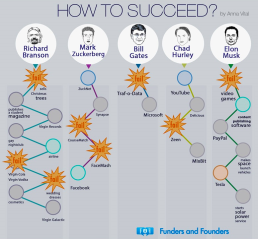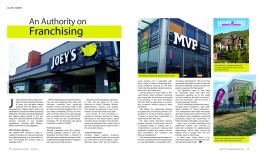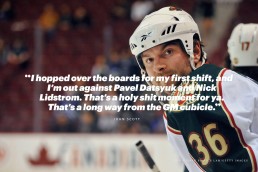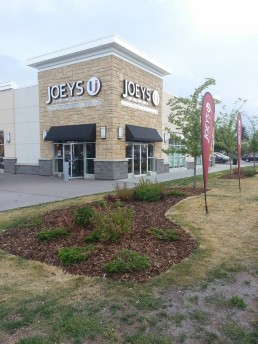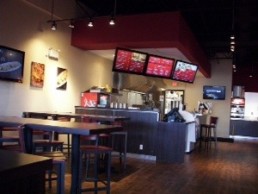Attitude
I preface this blog posting this week by saying that I am going to steal a few tidbits from my mentors and from an item/posting I saw on LinkedIn today.
All too often our attitudes get in the way of our success. There are many, many reasons are attitudes change our mindsets but I believe the number one way that you can adjust your attitude is by surrounding yourself with people with generally positive attitudes. Take a look at this picture, can you think of either of these tycoons that you haven’t always seen in a positive light, with a good attitude? 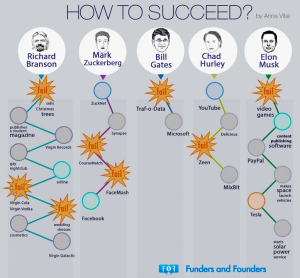
Success has so much to to do with NOT giving up, to keep on striving for your goals and therefore having a good attitude. After all, how do you overcome your failures if you can’t keep a good attitude on the outcomes.
At Joey’s Franchise Group, we stole a mantra from Simon Sinek that we try to live by and instill Values into our franchise community to keep great attitudes;
- Take an unconventional perspective
- Keep it simple
- Make long term progress
- Share………and,
- Silver Line it!
The goal is not necessarily to fix thing that are broken but to amplify the things that work!
Accountability

When a franchisee buys into a brand and opens their franchise there is obligations for both parties, the franchisee must; open their franchise in a timely manner, adhere to the standards an procedures outlined by the franchisor, etc etc., the franchisor must; provide the systems and standards, coach and train the franchisee’s on the those systems and standards etc..
So there is obligations? But what about the accountability? The accountability the franchisor should have to ensure the success of its franchisee’s, taking responsibility for its system. On the flip side, what about the accountability of the franchisee to fulfill its obligation and make an effort in its business and not solely rely on the franchisor to do so.
Far too often the disconnect between the franchisor/franchisee is about full time and attention by the franchisee and the “lack of support” that the franchisee feels they get. How do we connect these two groups again? How do we get franchisee’s to understand that as a franchisor you can provide the systems, the knowledge, the advertising but if the franchisee does not execute on their end when a customer uses their franchise, then there is nothing the franchisor can do?
Both parties have to start with being accountable to the other. Both have to fulfill their obligations to the other and hold each other ‘accountable’ from the very start. Both need to build and nurture the franchise relationship. As a franchisor if you have a franchisee who can’t or won’t do this, then you’ve got the wrong partner. As a franchisee, if you aren’t willing to adhere to the system and give it full time and attention, then you’ve probably chosen the wrong platform to do business. Franchises are great because your buying into a proven business system, many have tried and possibly failed before you to help improve your success rate. The system is in place but it still takes the individual(s) franchisee to execute it.
At Joey’s Franchise Group, we have proven the success of all of our systems and we pride ourselves in our open and honest role in our accountability to help our franchise partners execute their systems. Make sure the franchisor you choose can do the same!
Joey's Franchise Group in the press!
It was an honor to be chosen this year to be featured in not one but two Business Magazines to talk about our experience and our brands in franchising.
We are very proud of the brands we have established and believe that our success is a direct correlation to our franchise partners. We have a great group of people that we get to work with everyday, we are humbled by that.
Check out our feature articles here by clicking on the pictures to expand them.
Rob Hilditch – Joeys Franchise Group
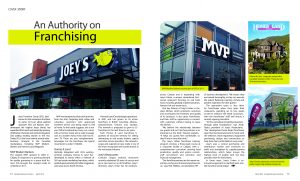
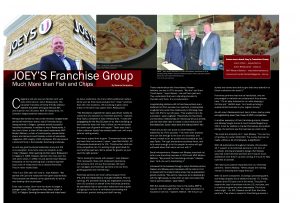
How we all should do business - The John Scott Story
A Guy Like Me
JAN 28 2016
JOHN SCOTT
ALL-STAR / NHL
“Hey, John, can we talk for a second?”
I guess I should have known.
But I have absolutely no idea what’s coming.
I’m in the weight room, hanging out with the guys, when my GM asks me to take a walk. I’ve been gone for a couple of days — but now I’m back in Phoenix, at the Coyotes practice facility, catching up with the boys. We’re getting some stretches in, and passing around my new gloves.
My All-Star gloves.
I’ve seen my name in the news, on the press release, on the official rosters. But even still: there’s just something about gear, you know? I, John Scott, from Michigan Tech, at 33 years old … have All-Star gloves.
The guys are all genuinely happy for me, and they’re letting me know it. They’re giving me some crap about it, too (of course), but it’s all in good fun. Everyone’s taking their turn, trying my gloves on. We’re laughing. It’s a cool moment.
As this is happening, I see our GM open the door.
He’s not smiling.
“Hey, John, can we talk for a second?”
We head down the hall a few steps, into the stick room of all places, and he shuts the door.
And then he tells me point blank.
“You just got traded.”
Nope. No way.
“You’re shitting me.”
I hear him perfectly the first time, but I need him to say it again.
“We just traded you to Montreal. Yeah.”
My mind is racing a mile a minute. I know exactly what’s happened.
Still, I can’t help myself.
“Are you fucking kidding me?”
Enforcers don’t get traded midseason when their team is winning. If you know the league, you know that it just doesn’t happen.
“I’m not sure what to say, John. This is how it goes. We’re trying to make our team better. We had a chance to get a player, and we took it.”
I’ll keep the rest of the conversation private, because I’m a professional. But you can fill in the blanks. It is, as we say in this business, emotional.
When I get to my car, I immediately call my wife.
“What’s wrong?” she asks.
I almost laugh. It’s all I can do.
“I just got traded.”
I can sense her mind racing a mile a minute, just like mine had.
“Nope. No. No way.”
She hears me perfectly the first time, but needs to hear it again.
“Yeah. Montreal. Well, actually … they already sent me down to the minors. So, Newfoundland.”
Newfoundland. Can you even get a flight from Phoenix to Newfoundland?
I pack up my stuff: my sticks, my skates, my gear. I walk back down to the gym, and grab my gloves — still sitting there, brand new, where the guys and I had been. John Scott, All-Star. I throw them in my bag, then place it in the trunk of my car, and begin the long drive home.
I try not to think about how young my daughters are, and how much they’ll hate the move. Or about the stress it will place on my wife, who is nine months pregnant with twins. Or about the fondness I feel for the guys in Phoenix — our group that no one believed in — and the pride I feel for what we’ve accomplished together. I try not to think about how I don’t want to leave.
And I try not to think about how I should have known.
Or about how my teammate called it — literally called it — way back before all of this got crazy.
How he texted me, “Dude, you’re 30th in the All-Star fan vote,” one night, out of the blue.
And then, how he added:
“They’ll never let you play, John. They’re never going to let you be there.
Not a guy like you.”
*
A guy like me.
You probably think you know me. Or at least the stereotype of John Scott. Well, let me tell you something that might surprise you: I never wanted to be a fighter. Growing up, I always made sure I had the Sherwood TP-70 stick.
Why? That was Ray Bourque’s stick. I was all about Ray Bourque, even though I lived in St. Catharines, Ontario. I guess I’ve always been a bit of a contrarian. All my buddies loved the Leafs and Canadiens. So I picked the Bruins. I thought the logo was cool. I remember being so mad that they wouldn’t let us pick numbers past 30 in Squirt hockey. I wanted 77, so I could be like Ray.
Look, I get it. I’m 6-foot-8. Everybody’s first question is always, “Were you beating kids up back in youth hockey?”
No. Of course not. I was a stay-at-home defenseman. Never the best player. I got cut from every Junior B team I tried out for. The coaches kept saying, “Too big. Too slow.”
I was like, too big? What the hell am I supposed to do about that?
So I got faster. And I did just enough to get myself a scholarship to play hockey at Michigan Tech University. The way I saw it, I would never make the NHL, but I’d have an engineering degree. By 30, I’d be sitting in an office at GM back in sleepy Ontario, in my suit, and happy as hell about it.
This was the old Western Collegiate Hockey Association — home of the 10-hour bus ride to road games in Minnesota and North Dakota. We even played Alaska-Anchorage. I remember being on these 10-hour bus rides — down single-lane roads in rural Minnesota, snow flying around everywhere, heater broken — and all the Business majors are watching movies and goofing around.
And I’m sitting there propping my engineering book up on my knees, taking a thermodynamics test. These knuckleheads are watching Billy Madison, and I’m trying to answer:
Question 5: A gun fires a bullet at the velocity of X, through a stack of five mattresses with a thickness of X. Please calculate the terminal velocity of ….
The bus is cold and dark bumping up and down. I’ve got equations scrawled everywhere. My buddies are yelling out Sandler lines. So the last thought in my mind was, Some day, you’re going to be an NHL All-Star.
If you think this is like Joke Athlete Engineering — no. Freshman year, 50 percent of the students would fail out of the intro chemistry course. They literally used to set up a boombox as you walked into the final that blared Queen’s “Another One Bites the Dust.”
But, somehow, I made it through. I got my degree. I got engaged. I was ready for my cubicle at GM.
[fusion_builder_container hundred_percent=”yes” overflow=”visible”][fusion_builder_row][fusion_builder_column type=”1_1″ background_position=”left top” background_color=”” border_size=”” border_color=”” border_style=”solid” spacing=”yes” background_image=”” background_repeat=”no-repeat” padding=”” margin_top=”0px” margin_bottom=”0px” class=”” id=”” animation_type=”” animation_speed=”0.3″ animation_direction=”left” hide_on_mobile=”no” center_content=”no” min_height=”none”]
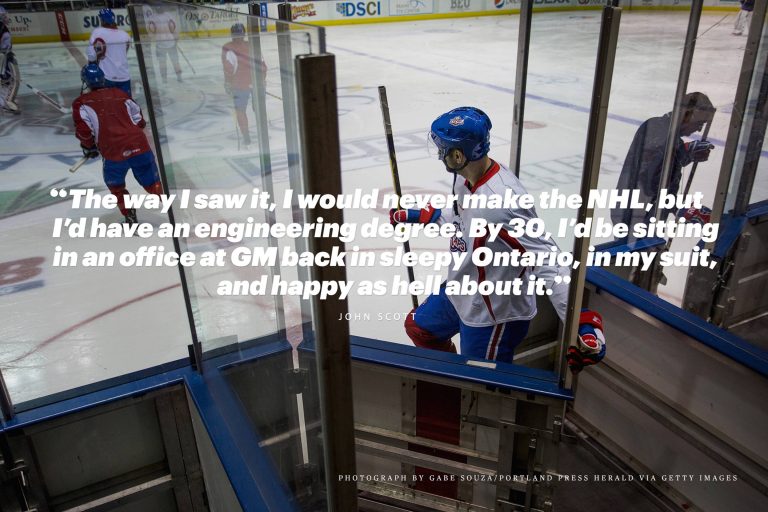
And then …
“Hey babe … I got an offer to play in the American Hockey League … in Houston.”
“No. No. No way.”
She thought it was insane. I made her a promise: give me three years. Three years, and then I’ll go back to the real world. I mean, I have my degree. What could happen?
In your mind right now, you’re probably thinking: classic. Big goon tries to fight his way all through the AHL to get a chance at The Show.
Well, here’s another thing about me you might not know: by 23, I had never been in a real hockey fight. Sure, I’d wrestled around in PeeWee and Juniors with a cage on, but that’s not real. I didn’t know the first thing about how to fight.
My first couple games in the AHL with the Houston Aeros, I heard this four, five times a game:
“Hey, ya big bastard, y’wanna go?”
“Let’s go. Right now.”
“We’re going.”
I kept saying, “Uh, no. No, I’m good.”
Then it happened. I’ll never forget being in the locker room before a game against Peoria.
We’re ready to go out onto the ice, and my coach looks around the room. Then he looks right at me, dead in the eyes.
“Scott. Do. Not. Fight. D.J. King.”
I’m like, “Who the hell is D.J. King?”
His eyes are bulging now, like, “D.J. King is a billed heavyweight. D.J. King is a freaking animal.”
So what I did was … I fought D.J. King.
And what he did was … he busted me right in the jaw.
At that moment, I realized, Oh, okay. Wow. This is what it feels like to get really hit. But somehow, I was able to keep my feet and kind of win the fight. My teammates went nuts.
And then I realized another thing: Oh, okay. Wow. This feels good. Not my face. That feels bad. But it feels good to make my teammates go nuts.
So that’s how it went. I embraced it, because it was my way forward, not because it was my nature. Fighting, no matter how big you are, is not easy. By my third year in the AHL (and final year of my promise to my fiance, now my wife), we were on a road trip when I got a call I never saw coming.
“Hey, the Wild want you in Calgary. Tonight.”
The Minnesota Wild. Wanted me to play in Calgary. I called everybody in my phone, told them I was playing in the NHL. Tonight. I think it was even a Hockey Night in Canada game.
I get to the airport, thinking about pulling on the sweater, skating out in front of 20,000 people.
“Sir, your passport?”
My passport?
My fucking passport! No.
Back then, the only guys who took their passports on the road were the hotshots who thought they might get called to play a game in the NHL. In Canada. I was not one of those hotshots. (Because of me, they now make guys take their passports everywhere).
I begged the airport attendant. I showed her my driver’s license. I showed her pictures of me in my hockey jersey. I laid the Canadian accent on thick.
“Ma’am, I’m a Canadian citizen! I need to get on that flight. I’m suppose to play in the NHL tonight, eh?”
Nope. She wouldn’t budge. I was crushed. I mean, that’s not an easy call to make to an NHL team. “Hey, crazy story, uh … I don’t have my passport.”
I thought I was done. But, yet again, somehow things just worked out, and I got another chance a few weeks later. Against the Detroit Red Wings, of all teams. I hopped over the boards for my first shift, and I’m out against Pavel Datsyuk and Nick Lidstrom.
That’s a holy shit moment for ya. That’s a long way from the GM cubicle.
You know what? I stuck around. My wife and I had to move all across the country, year after year. But I stayed in the NHL, by any means necessary.
It is not easy. People think enforcers skate out there for two minutes a night, take a few pops and call it a night. What a life, right?
But I’ll be honest. You can never shut it off. It’s a 24/7 job. When you know a fight is coming up, you can never shut off your brain. You can be the toughest, baddest guy in the NHL, and there’s still that fear.
My first few years in the NHL, it was so bad that I wouldn’t sleep. I’d stay up all night on HockeyFights.com and YouTube, researching the tendencies of the next enforcer on the schedule. Steve Macintyre. Eric Godard. I could go on and on. You’d see these monsters on the schedule weeks in advance, and your mind would already start racing.
This is the job we sign up for. One day, my wife couldn’t take it anymore, and she said, “John, you know those guys you’re so worried about? They’re probably sitting at home on their laptop right now, watching you beat somebody up. They have the same fear.”
That was a breakthrough.
When I had my daughters, that helped, too. For some reason, it helped me shut off my brain when I came home. I became a hockey player that I hoped they could be proud of. I even scored three goals with the Sharks last season. They loved that.
*
“Do you think this is something your kids would be proud of?”
That was it, right there. That was the moment they lost me.
At first, when it became clear that I was going to win the All-Star fan vote, I understood the league’s position. They didn’t mince words — This is not a game for you, John — but I understood all the same. Honestly, on some level, I agreed.
In the beginning, at least, I just wanted the entire thing to go away. We were on a really fun run in Phoenix, and I was starting to feel like I was part of something. The Coyotes had been picked to finish dead last — but in the first half of the season, we’d surprised a lot of people. We were this strange collection of underdogs, and I fit right in. And I fit right in by doing what I do best: being a locker room guy, a no-nonsense guy, and a quiet yet effective enforcer.
I’ve gotten texts from so many guys saying the same thing: “You should go.”
One of the reasons I’ve made it as long as I have in the league is because I specifically know I’m not an All-Star.
So when they asked me to make a statement — nudging the fan vote in another direction and denouncing the John Scott “movement” — I did it without hesitation. I told the fans, “Listen. I don’t deserve this. Vote for my teammates.” And I was telling the truth.
But while I don’t deserve to be an All-Star, I also don’t think I deserve to be treated like I’ve been by the league throughout this saga. I’m an NHL player — and, whatever my set of skills may be, that I’m an NHL player is no accident. I genuinely believe that when I’m on the ice, or even just the bench, I make my teammates feel safe to do what they do best.
Does that make me an elite player? God, no. Am I going to be nervous as hell when I step onto the ice on Sunday — and I’m playing three-on-three, with Tarasenko whizzing by over one shoulder, and Toews putting the moves on me over the other? Of course. Will I be the worst skater in the game? I mean, probably.
But at the same time: this isn’t Charlie and the Chocolate Factory. I’m not some random person off the str
[/fusion_builder_column][fusion_builder_column type=”1_1″ background_position=”left top” background_color=”” border_size=”” border_color=”” border_style=”solid” spacing=”yes” background_image=”” background_repeat=”no-repeat” padding=”” margin_top=”0px” margin_bottom=”0px” class=”” id=”” animation_type=”” animation_speed=”0.3″ animation_direction=”left” hide_on_mobile=”no” center_content=”no” min_height=”none”]
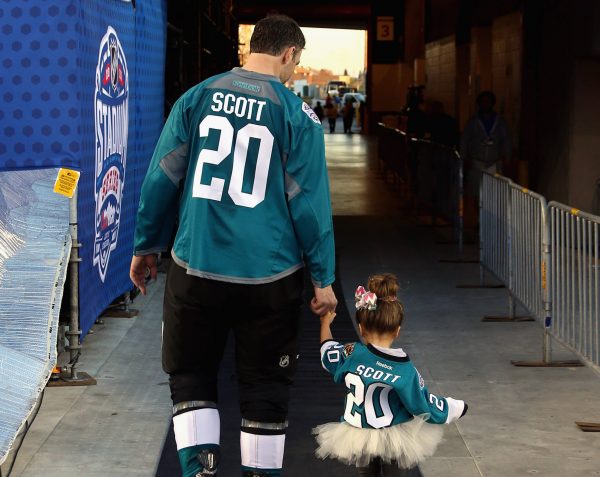
eet, and I didn’t win a golden ticket to “play hockey with the stars.” I won an internet fan vote, sure. And at some point, without question, it was a joke. It might even finish as a joke. But it didn’t start as one. It started with a very small pool, out of a very small pool, out of the very, very smallest pool of hockey players in the world: NHLers. That was the vote. A fan vote, an internet vote — but a vote from among the 700 or so best hockey players in North American professional sports.
And I’m one of them.
If the league thought this was an embarrassment, pretty much all of the players I’ve encountered have thought otherwise. I’ve gotten texts from so many guys saying the same thing: “You should go.”
And that didn’t happen because of the internet. I busted my ass to be one of them. I’ve skated every day since I was three years old to be one of them. I’ve persevered through Juniors roster cuts, Alaskan bus rides, Advanced Dynamics exams, and — yes — fights, to be one of them.
But I’m one of them. And that means a lot to me.
It means a lot to my family.
So when someone from the NHL calls me and says, “Do you think this is something your kids would be proud of?”
… That’s when they lost me.
That was it, right there. That was the moment.
Because, while I may not deserve to be an NHL All-Star, I know I deserve to be the judge of what my kids will — and won’t — be proud of me for.
The irony is that my daughters are two of the biggest NHL fans around. My oldest, Eva, loves hockey. Loves watching me play. Loves following my teams. And, yeah, she’s super-pumped about All-Star. My youngest, Gabriella, is a little too young to “follow” it — but she loves it all the same. She has all of my jerseys — from the Blackhawks, to the Wild, to the Rangers, to the Sharks — and she wears them constantly. And, in Phoenix, whenever Daddy would leave for a big game … she’d be right on cue:ahhh-oooooh. (That’s a coyote howling.)
When they see me on the ice on Sunday, will my girls be proud of me? Who knows. I like to think so. But I know they’ll be there for me — for their big, goofy dad — no matter what. They’ll be there, in the stands, cheering me on — wearing their Scott jerseys, and watching me try my best, have some fun and fulfill a dream I’ve had since I was, well, their age.
Eventually, when they’re old enough, I’m sure I’ll tell them the whole story. About that one crazy January, when they were younger: when our family moved all of a sudden; when we stopped howling,ahhh-oooooh; when the twins were born; and when their father made the news and played that weird game in Nashville.
It’ll be a pretty good story, I hope.
I imagine they’ll give me some crap, while I tell it — though (of course) in good fun.
Then I imagine we’ll catch up for a little, rinkside. We’ll get some stretches in. And maybe, if they have time before practice, they’ll even try on my old gloves.
My All-Star gloves.
JOHN SCOTT / CONTRIBUTOR[/fusion_builder_column][/fusion_builder_row][/fusion_builder_container]
Entrepreneur - The best franchise advice you'll get.
When you are looking into a franchisor the best thing to look at is the success of their partners and how they interact with them. Franchise systems  are made to be simple, understandable and certainly, repeatable! I am sharing a great article by Jeff Elgin in Entrepreneur Magazine that dictates everything you should do when researching a franchise system. I encourage you to do everything he suggests and put Joey’s Franchise Group to the test!
are made to be simple, understandable and certainly, repeatable! I am sharing a great article by Jeff Elgin in Entrepreneur Magazine that dictates everything you should do when researching a franchise system. I encourage you to do everything he suggests and put Joey’s Franchise Group to the test!
Check out his article here: The best franchise advice you’ll get…..
Sustainability
At Joey's Franchise Group we are doing what we can to mitigate our impact on fisheries and ultimately our environment. Our brands Joey's Restaurants and Joey's Urban have teamed up with Ocean Wise, a Vancouver Aquarium Conservation Program, to ensure that we're on the right path to sustainability. Check it out here; Ocean Wise and Joey's
MVP Modern Barbers in Canadian Business Franchise Magazine
Take a read of this article about our Franchise Partner Jodi Tucker at our South Surrey location. Jodi worked with MVP Modern Barbers for many years in our Kelowna Franchise before shearing off to the Lower Mainland to open her own Franchise. (see what i did there! haha Shear).
MVP Modern Barbers Article in Canadian Business Franchise
People don't buy what you do, they buy what you believe....
Simon Sinek started this movement, we just stole it. Thanks Simon
At Joey’s Franchise Group we always strive to fight for what we believe, whether it be the best quality seafood for our Joey’s and Joey’s Urban Restaurants, or the quality of printing and paper we demand for our Homes & Land Magazine or better so, the Charities we choose to align ourselves with at MVP Modern Barbers.
This month is #Movember 2014. If you haven’t already been directly affected by Mens Health issues, specifically Prostate Cancer, then you most likely will be soon or know someone that has had to.
[fusion_builder_container hundred_percent=”yes” overflow=”visible”][fusion_builder_row][fusion_builder_column type=”1_1″ background_position=”left top” background_color=”” border_size=”” border_color=”” border_style=”solid” spacing=”yes” background_image=”” background_repeat=”no-repeat” padding=”” margin_top=”0px” margin_bottom=”0px” class=”” id=”” animation_type=”” animation_speed=”0.3″ animation_direction=”left” hide_on_mobile=”no” center_content=”no” min_height=”none”]
We strongly believe in this cause and have teamed up in Calgary this month with Calgary’s All New Alternative Rock Radio Station, @x92.9. Our MVP executive staff have joined the respective teams of Lynch and Tyler (the morning show team) to #kickcancersass! Join the battle between Paul Clissold (MVP Owner) and Rob Hilditch (his lacky, aka, ME) as they complete for the best stache and biggest donation money list! Check out Rob’s Mopage here; ROB’s MOpage (hey it’s my Blog!). You can search for Paul if you really want to.
I lost a mentor, friend and a great man to Prostate Cancer in 1999, in fact 15 years ago today. He past after fighting it and beating it once, 9 years earlier. He got to meet his grand daughter, thankfully, born in May of 99′, and I tell her everyday how great he was and how much she reminds me of him.
I’m fighting this fight because of him, because of her, my other two daughters, my wife and every other family that has had to deal with the tragedy that cancer leaves behind.
We believe…….Donate hard.
http://mobro.co/10633485[/fusion_builder_column][/fusion_builder_row][/fusion_builder_container]
Joey's Urban - International Avenue - Calgary
Grand Opening this weekend at our newest Joey’s Urban, located in Calgary on International Avenue (4501 17th Ave SE, Calgary). Come check out our 2-fer’ Promotion starting this Thursday!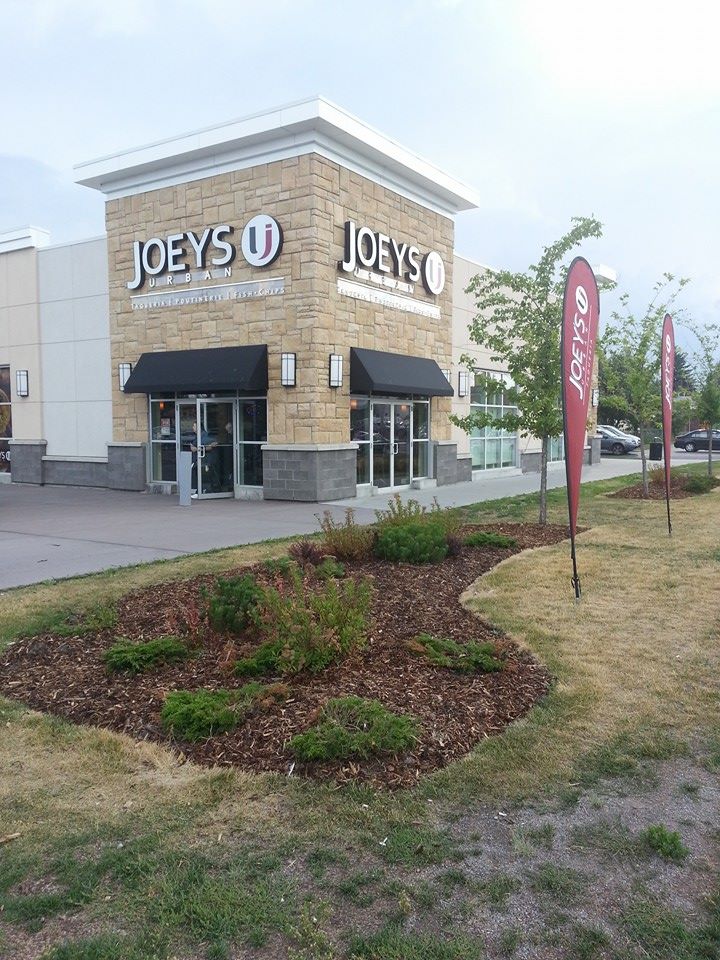
13 Things to Consider when Buying a Franchise in Canada
 Great Article by;
Great Article by;
Tony Wilson
Special to The Globe and Mail
Published Tuesday, Sep. 09 2014, 5:00 AM EDT
Last updated Tuesday, Sep. 09 2014, 8:30 AM EDT
1. What’s a franchise? A franchise is essentially a licence to operate the franchisor’s business system and use its trademark according to the franchisor’s standards. The term is normally for between 5 and ten years, depending on the agreement and the lease. In exchange for the right to carry on business under the franchisor’s trademark and system, the franchisee usually pays the franchisor an initial fee for these rights (somewhere between $15,000 and $100,000), and an ongoing royalty linked to the gross sales of the franchised outlet (between 5 per cent and 8 per cent of gross sales). There’s usually a requirement for the franchisee to make regular contributions to a regional or national advertising fund as well (between 1 per cent and 4 per cent of gross sales), so that the franchisor can advertise the brand in high-cost media using the contributions of all franchisees. If it’s a bricks and mortar business, the franchisee either constructs and develops the premises itself (at its cost) or can buy the constructed premises on a ‘turnkey’ basis from the franchisor.
Franchisors are essentially selling three things: the value of a (hopefully) recognizable trademark and brand; the know-how associated with the franchisor’s business system (and the franchisor being able to teach that know-how to the franchisee); and the lower unit costs that come from the purchasing power of a large buying group
2. You’re not buying the business system, you’re renting it. You’re simply acquiring the rights to use a franchisor’s business system, trademark and ‘know-how’ for 5 or ten years, depending on the term of the franchise and any renewal rights contained in the franchise agreement. Think of it like a lease. You’re ‘renting’ the franchisor’s business system and brand for a time, and when that time is up, it’s over. Those rights revert back to the franchisor, who can sell those rights to someone else
3. Renewal and assignment rights are not automatic. Virtually all franchise agreements allow for the right to renew for at least one term, and permit the franchisee to assign the contract. But there are always conditions (and fees) that go along with the exercise of renewal and assignment rights. If you don’t meet those conditions, you wont be able to renew or assign.
4. Critically assess the FDD and all financial and other information given to you. Franchisors awarding franchises in Alberta, Ontario, Manitoba, New Brunswick and PEI are required by law to provide a FDD to prospective franchisees at least 14 days before the franchisee signs any agreement relating to the franchise or pays any money (this differs slightly depending on the province).
The FDD is required to contain all material facts relating to the franchise investment, and there are very serious legal remedies available to franchisees if the franchisor fails to comply with its disclosure obligations. Read the FDD and the documents attached to it carefully with your lawyer and financial advisor. Remember that although these documents will assist you in assessing the nature of the investment, they’re always written for the franchisor’s benefit, and will be crafted to put the franchisor and the franchise system in the best light possible, even when there are lawsuits and other problems facing the franchisor. Also appreciate that if you are in B.C., Saskatchewan, Nova Scotia, Newfoundland and Quebec, there is no legal obligation for a franchisor to provide you with its FDD, and no statutory remedies available to you in the event the franchisor fails to disclose a material fact relating to the franchise as in Ontario, Alberta and the other ‘disclosure provinces.’
5. Be careful of U.S. franchise agreements that have not been adapted to Canadian laws. Sometimes U.S.-based franchisors forget that Canada is a separate country. They don’t modify their agreements to suit Canadian laws. In particular, a U.S. franchisor may not have contemplated the effect of Canadian withholdings tax, something I’ve written about before and which could cost you additional money if not dealt with at the outset of the arrangement.
6. Don’t get sidetracked negotiating the boilerplate. Franchisors pay their lawyers lots of money to draft standard, solid and enforceable franchise agreements that they can use with all their franchisees with little or no amendments. The franchisee lawyer that sends the franchisor a 25-page list of changes to the franchisor’s agreement is arguably unfamiliar with the norms of the franchising relationship. Part of the lawyer’s job is to know what’s ‘normal’ and what’s not; what’s negotiable and what’s not.
7. If you can, avoid entering a franchise agreement where both you and your spouse have to guarantee the contract. It only means the franchisor has two of you to sue if the business fails. If at all possible, limit your exposure so that only one of you assumes all the risk. You might also consider capping any personal guarantee to a maximum amount.
8. Trademarks. Does the franchisor own or control the trademark? (The Canadian Intellectual Property Office has a search engine that allows you to check trademark applications and registrations here)
9. Pricing for products. What assurances are there that the products for sale by the franchisor can be bought by the franchisee at competitive prices? What if the products for sale have to be shipped from another part of the country, or another country? Have you factored in freight costs and duty? A 91-cent dollar can create problems for Canadian franchisees who may be required to buy products from the U.S. in U.S. dollars and pay royalties and other fees in U.S. dollars.
10. Exclusive territory. Are you getting an exclusive territory as part of the deal? Can it be lost or reduced?
11. Don’t forget to talk to other franchisees in the system. Even if they’re in other parts of the country thousands of miles away, their input is invaluable. And if they are reluctant to speak with a stranger out of the blue, ask these three questions: Are you happy? Are you making any money? Would you do it again?
12. If the franchisor is not a member of the Canadian Franchise Association (CFA), ask ‘why not?’ The CFA is the only association of franchisors and service providers in the franchise industry in Canada. It has extensive rules on ethical franchising and advises prospective franchisees to investigate before investing. If the franchisor isn’t a member, why not?
13. Don’t let your expectations get away from you. Finally, like any other investment, acquiring a franchise involves a high degree of risk. Some franchises work out very well for the franchisees. And some do not. Do not sell the concept to yourself. Be prepared to walk away.
Joey’s Franchise Group has a franchise that fits your needs and these rules. Call Rob Hilditch at 1-800-661-2123 for more details.
Tony Wilson is a franchising, licensing and intellectual property lawyer at Boughton Law Corp. in Vancouver, he is an adjunct professor at Simon Fraser University (SFU), and he is the author of two books: Manage Your Online Reputation, and Buying a Franchise in Canada. His opinions do not reflect those of the Law Society of British Columbia, SFU or any other organization.
Original Link:
http://www.theglobeandmail.com/report-on-business/small-business/sb-growth/day-to-day/thirteen-things-to-consider-before-buying-a-franchise-in-canada/article20471510/
